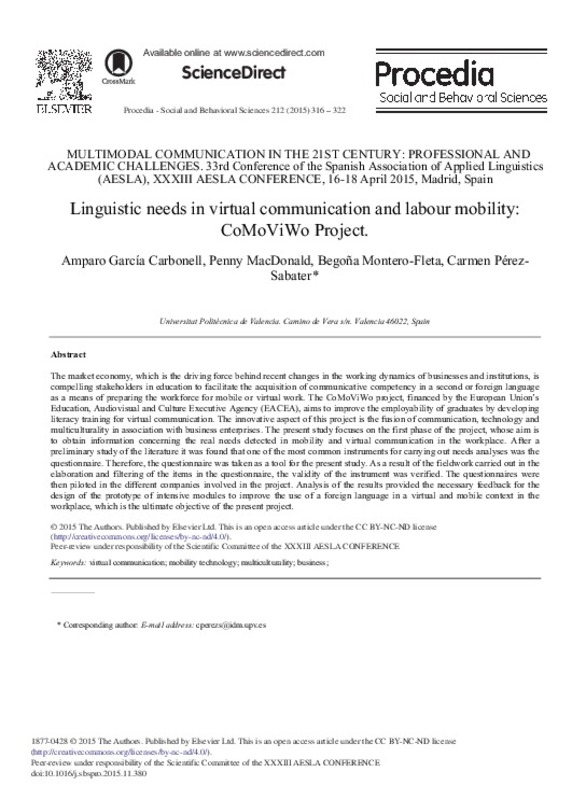JavaScript is disabled for your browser. Some features of this site may not work without it.
Buscar en RiuNet
Listar
Mi cuenta
Estadísticas
Ayuda RiuNet
Admin. UPV
Linguistic needs in virtual communication and labour mobility: CoMoViWo Project
Mostrar el registro sencillo del ítem
Ficheros en el ítem
| dc.contributor.author | García Carbonell, Amparo
|
es_ES |
| dc.contributor.author | Mac Donald, Penny
|
es_ES |
| dc.contributor.author | Montero Fleta, Maria Begoña
|
es_ES |
| dc.contributor.author | Pérez-Sabater, Carmen
|
es_ES |
| dc.date.accessioned | 2016-05-04T12:10:23Z | |
| dc.date.available | 2016-05-04T12:10:23Z | |
| dc.date.issued | 2015-12 | |
| dc.identifier.issn | 1877-0428 | |
| dc.identifier.uri | http://hdl.handle.net/10251/63594 | |
| dc.description.abstract | The market economy, which is the driving force behind recent changes in the working dynamics of businesses and institutions, is compelling stakeholders in education to facilitate the acquisition of communicative competency in a second or foreign language as a means of preparing the workforce for mobile or virtual work. The CoMoViWo project, financed by the European Union s Education, Audiovisual and Culture Executive Agency (EACEA), aims to improve the employability of graduates by developing literacy training for virtual communication. The innovative aspect of this project is the fusion of communication, technology and multiculturality in association with business enterprises. The present study focuses on the first phase of the project, whose aim is to obtain information concerning the real needs detected in mobility and virtual communication in the workplace. After a preliminary study of the literature it was found that one of the most common instruments for carrying out needs analyses was the questionnaire. Therefore, the questionnaire was taken as a tool for the present study. As a result of the fieldwork carried out in the elaboration and filtering of the items in the questionnaire, the validity of the instrument was verified. The questionnaires were then piloted in the different companies involved in the project. Analysis of the results provided the necessary feedback for the design of the prototype of intensive modules to improve the use of a foreign language in a virtual and mobile context in the workplace, which is the ultimate objective of the present project. | es_ES |
| dc.language | Inglés | es_ES |
| dc.publisher | Elsevier | es_ES |
| dc.relation.ispartof | Procedia Social and Behavioral Sciences | es_ES |
| dc.rights | Reconocimiento - No comercial - Sin obra derivada (by-nc-nd) | es_ES |
| dc.subject | Virtual communication | es_ES |
| dc.subject | Mobility technology | es_ES |
| dc.subject | Multiculturality | es_ES |
| dc.subject | Business | es_ES |
| dc.subject.classification | FILOLOGIA INGLESA | es_ES |
| dc.title | Linguistic needs in virtual communication and labour mobility: CoMoViWo Project | es_ES |
| dc.type | Artículo | es_ES |
| dc.identifier.doi | 10.1016/j.sbspro.2015.11.380 | |
| dc.rights.accessRights | Abierto | es_ES |
| dc.contributor.affiliation | Universitat Politècnica de València. Departamento de Lingüística Aplicada - Departament de Lingüística Aplicada | es_ES |
| dc.description.bibliographicCitation | García Carbonell, A.; Mac Donald, P.; Montero Fleta, MB.; Pérez-Sabater, C. (2015). Linguistic needs in virtual communication and labour mobility: CoMoViWo Project. Procedia Social and Behavioral Sciences. 212:316-322. doi:10.1016/j.sbspro.2015.11.380 | es_ES |
| dc.description.accrualMethod | S | es_ES |
| dc.relation.conferencename | 33rd Conference of the Spanish Association of Applied Linguistics (AESLA), XXXIII AESLA CONFERENCE | |
| dc.relation.conferencedate | April 16-18, 2015 | |
| dc.relation.conferenceplace | Madrid, Spain | |
| dc.relation.publisherversion | http://dx.doi.org/ 10.1016/j.sbspro.2015.11.380 | es_ES |
| dc.description.upvformatpinicio | 316 | es_ES |
| dc.description.upvformatpfin | 322 | es_ES |
| dc.type.version | info:eu-repo/semantics/publishedVersion | es_ES |
| dc.description.volume | 212 | es_ES |
| dc.relation.senia | 302089 | es_ES |








